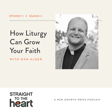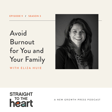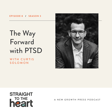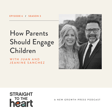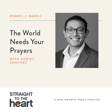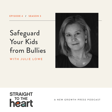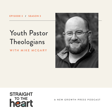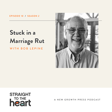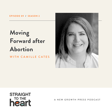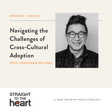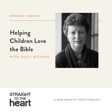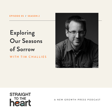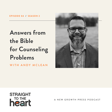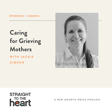Introduction to 'Straight to the Heart'
00:00:00
Speaker
Sure. I'm glad you asked the question the way you did, but I'm going to answer it the way I want. I mean, I think one of the great, one of the things I can say with certainty is everybody changes. Change occurs throughout this process all the time.
00:00:18
Speaker
I'm Rush Witt and you're listening to Straight to the Heart, a podcast from New Growth Press. Each episode includes thought-provoking conversations with leading Christian writers and thinkers. We hear who they are, what they believe, how they approach their work in ministry, and the moments and people who have changed their lives. In Straight to the Heart, we go beyond the books to connect with the remarkable people
Meet Chris Moles: Pastor & Counselor
00:00:42
Speaker
We're well into our second season, so thank you for listening to, sharing, and subscribing to Straight to the Heart. Today, I enjoyed a helpful conversation with Chris Moles, a pastor and biblical counselor who helps churches and families confront the evil of domestic violence and promote healthy, God-honoring relationships.
00:01:03
Speaker
His ministry Peace Works produces resources and a podcast to help pastors, churches, and ordinary Christians confront domestic abuse with the gospel. In this episode, we talk about all of this, and we also consider the question, can abusers really change? And if so, how? This is Straight to the Heart.
00:01:27
Speaker
Chris Moles, I am really looking forward to talking to you because I always enjoy talking to you. You're easy to talk to, you're encouraging and interesting to talk to, so I'm glad that we had this chance to have this conversation today. My pleasure, Rush, and I always enjoy you listening to me talk. It's one of my great pleasures.
00:01:48
Speaker
Yeah, we have we obviously have a number of things in common, common interests. Probably the most trivial of them is interest in basketball, probably high school basketball because of kids playing and coaching and, you know, high ambition there. But but more importantly,
Chris Moles' Journey into Domestic Abuse Ministry
00:02:06
Speaker
biblical counseling ministry. And so we'll have an opportunity to talk about about those things. But I'd love to hear just sort of what's going on in your family now. Of course, I know that
00:02:16
Speaker
Your mom passed away recently and was sorry to hear about that. We talked about that before, but we just want to see how your family is and what's new in your world. It seems like, and I appreciate you opening the door for that, it seems like everything is new. Our oldest son had his first semester of college and was headed off.
00:02:39
Speaker
Uh, unfortunately we had to say goodbye to my mom real sudden and tragic and, um, just the whole, you know, season of our life was kind of upended. And so my wife said, it's, it's like we had layers of grief, you know, saying goodbye to our oldest and then saying goodbye to my mom. And so we're still in that limbo as the, as at the time of this recording, my, my son's still on campus because of basketball. He's got one more.
00:03:05
Speaker
Uh, one more game before they get their Christmas break. He's been on campus kind of alone for a couple of weeks and we'll be headed back home, you know, this coming weekend. So we'll get a chance to visit and catch up then. Yeah. Where does he go to school? He's currently a freshman at Boyce college in Louisville. Oh yeah. My daughter goes to Boyce college. She's a sophomore. Now we know. There you go. So, um, tell me a little bit about your, uh, current place in ministry.
00:03:34
Speaker
And in particular, the important work that
Domestic Violence in Society and Church
00:03:37
Speaker
you do in domestic abuse ministry and kind of how you came into this area of ministry and to become really what is a prominent voice and help to people who are trying to minister in such difficult situations.
00:03:53
Speaker
I've been in pastoral ministry for 24 years and early on in that process, actually before I graduated from college, I was a senior at Cedarville College at the time and did my internship at a church that was learning and growing in ministry of biblical counseling. This was in 1999. And so I really engaged in counseling at that point, fell in love with it, it kind of changed the trajectory of
00:04:23
Speaker
my understanding of ministry. And so my very first ministry position in 99 as a youth pastor, I was also counseling and within a year, less than a year, really, I was approached by criminal corrections. I needed some extra money and started working part time for corrections, not, not in any type of
00:04:45
Speaker
judicial way or nothing with arrest powers. I was just an educator. I started in juvenile crime and then began to teach in the day reporting center life skills and parenting classes and things mostly with drug offenders and just loved it. I mean, I spent several years working with parenting classes for folks. Back then it was methamphetamine was the
00:05:09
Speaker
the big drug that was kind of so destructive and people trying to get their life back together and get access to their kids.
Understanding Different Forms of Domestic Abuse
00:05:15
Speaker
And it was just a great.
00:05:17
Speaker
gospel opportunity. I did that for years. The Lord called us to church planting with the Christian Missionary Alliance, and we did that. Then things shifted at the day report. They started asking me if I would help them start a new program for domestic violence. I really shied away from it. I just didn't want to jump into it. I really enjoyed what I was doing. They asked and asked.
00:05:41
Speaker
then they persuaded me by offering me more money and so I jumped into it because we needed the cash and it ended up changing my life. The Lord used that
00:05:53
Speaker
that first year, I think, of domestic abuse work, it was like I had, you know, took whatever pill, whatever matrix pill, right, the correct one, and kind of woke up. I had no clue the numbers of people around me that were suffering with this problem. And around the same time, I started my MABC, my Master of Biblical Counseling at Faith Seminary, and the world's just collided.
00:06:22
Speaker
realizing that there wasn't much written or said about domestic abuse and the stuff that was out there. I don't mean to be uber critical. It just wasn't informed by a lot of case wisdom. So in biblical counseling, we would have, you know, this person wrote an article because they had a case of abuse or this person wrote a piece because they read a passage of scripture
Ministerial Approaches to Domestic Abuse
00:06:43
Speaker
and they thought it applied to abuse. And, you know, at that point, you know, I'm dealing with hours and hours every week.
00:06:51
Speaker
of domestic abuse cases, and I'm starting to take both of those worlds and mash them together. And I think that was obviously the Lord's plan all along. I never would have chose that. In 2015, we wrote the first book. I wrote the first book, The Heart of Domestic Abuse. And since then, it's just been a lot of answering questions and consulting. And now, as you know,
00:07:14
Speaker
We were in a desert when it came to resources, and now it's almost an embarrassment of riches as biblical counselors.
00:07:22
Speaker
are producing, I think, as much or more material than anything we're seeing in the secular world on the topic of domestic abuse. It's amazing, yeah. It's amazing and really great help, and hopefully that continues, and I'm sure that it will. I'm curious, when domestic abuse ministry was first suggested to you as an area of ministry that you could be involved in, what was your initial response to that?
00:07:49
Speaker
was that familiar to you? Did you have experience? Obviously, you had experience ministering in tough places with correctional facilities, but what was your initial thought about domestic abuse? Was it something appealed to you? Was it something you were unsure about? It was really foreign to me. I had one brief encounter as a child with a family member where my parents had taken in a family member
00:08:13
Speaker
as a result of domestic abuse. And I recall that season of life fairly well, but only as mostly reflecting how godly and wonderful my parents were. It was like, well, of course that's what you do, but it's got to be, you know, in my mind, it was still a rare occurrence. It wasn't till really, I think it was day two of my initial training. I'm sitting in the police Western police academy.
00:08:40
Speaker
And we're going over some of the statistics and we're sharing some stories. And I'm like, my goodness, most of the people in this room have been touched by abuse, like significant abuse. And that became a really, a big theme for me as I had such little knowledge firsthand knowledge.
00:09:00
Speaker
of abuse and then yet I was encountering so many people and of course in corrections it's going to be a higher level. Criminal abuse is just such a different animal but the number of people I was encountering on a regular basis who had had childhood sexual assault, who were experiencing domestic abuse, who were in like the criminal loop of just perpetrating acts of abuse over and over and over, it really opened my eyes to
00:09:27
Speaker
just how extraordinary the problem was, how far reaching the problem was. And then I think that's when the ministry light bulb started to go off because I'm working in a secular environment.
00:09:40
Speaker
and quickly becoming the pastor in that environment, right? Because the church and the domestic abuse world, they don't intermingle very well. And they're usually pretty hostile towards each other. And I experienced that hostility early on. A friend of mine called me the unicorn because of being an evangelical, conservative evangelical pastor at work. But it quickly became apparent that not
Diverse Domestic Abuse Cases & Safety Planning
00:10:03
Speaker
only was there hostility, there was just little communication, dialogue, or information. So that's when I began collecting.
00:10:10
Speaker
And I tell the story that, you know, I collected everything that had ever been written on domestic abuse from a Christian perspective, not just complimentarian or conservative and everybody. And it all fit. It's actually right there in my floor, a cardboard file folder box that's not sitting in my office. And I had printed off every blog. I had gotten the copies of every journal article, every book and stuffed them in that box. And that was it.
00:10:37
Speaker
And that was, I think, rushed the point where I was like, well, I don't know what to do, but I've got to do something. So I began doing all my papers in seminary. I would ask permission and then faith was so good to kind of change the structure. I was in the very first MABC class ever and the first graduating class at faith. And they originally were going to have this comprehensive final and they added a thesis component.
00:11:04
Speaker
right before we went in and it got approved and so I wrote a thesis and that thesis ended up being the bones or the heart of domestic abuse. So can you put it into perspective for me because I have a certain sense but you're in the middle of it of what the frequency or volume of abuse cases is because I think there are probably a lot of people
00:11:27
Speaker
Christians who are active in ministry but they just they may not recognize it or they may not they may not be around it they may not realize how frequent it is just because they don't hear about it so can you put that into perspective of how how big of it sounds like a silly way to ask that question but how big of a problem is this yeah so let's talk well we'll talk a little statistically and then we'll run into some anecdotal stuff
00:11:54
Speaker
It's estimated that one in three to one in four women have been will be or currently are a victim of intimate partner violence and that is
00:12:05
Speaker
coercive control at the hands of an intimate partner, husband, boyfriend, so on. Uh, the rates actually increased slightly when you consider a sexual assault, sexual abuse. It's estimated that one in three women, uh, have been or will be a victim of sexual assault, which is devastating when you think about that. And of course, criminally, uh, a very different world because of prosecution for sexual assault. So low.
00:12:33
Speaker
and reporting is so low. And of course, domestic abuse is very similar to that as well. There was a group out of Canada. They did two different studies. The Rave Project, Nancy Nason Clark would be the head of that. She was a professor in New Brunswick, I believe. And they did two studies, I believe 10 years apart, concluding the same thing, that there's no discernible difference between the rates of domestic abuse in the culture and those within the church.
00:13:00
Speaker
And that was, yeah, that was probably the most disturbing statistic to me. But I'll tell you Rush, anecdotally, I mean, I can't prove it other than to say we have a serious problem. And if you're listening, you're going to encounter it. And I would say most of my friends that are in the work that are believers would articulate the same thing that on any given Sunday,
00:13:22
Speaker
about a quarter of the women in your congregation have been, will be, or are currently subjective to coercive control in an intimate relationship. And so when you say that, what kind of things do you include to kind of flesh that out into a definition of, you know, more specific, what kinds of things are happening in their lives? Yeah, that's a good question. And one that I think we as Christians struggle with the most, I think we want
00:13:48
Speaker
real firm formula make definitions. I'm going to be a little broader, but hopefully I can be broad in a biblical sense so that we can see that abuse is really about the heart as much as it is about the behavior. One thing that Jeremy Pierre and Greg Wilson do a great job saying in their book, When Home Hurts, is that abuse is a corrupted perception as much as a corrupted behavior. And again, people helpers who are in this work see that because something that would be innocuous or benign or just
00:14:17
Speaker
Innocent in one relationship could be completely sinister in another Getting up on the
Equipping Church Leaders for Domestic Abuse Cases
00:14:23
Speaker
backstory and the leverage and so we always begin or try to begin with understanding threat and Fear and that is usually associated with physical or sexual abuse. We are much more comfortable there because we can quantify what physical abuse looks like what sexual abuse looks like as somebody who's worked with thousands of men who are abusive and
00:14:47
Speaker
over the years, I can tell you that most of my guys would say, if I can get what I want without using physical violence, I will because the physical stuff will get you in trouble.
00:14:58
Speaker
Well, what that tells me is the heart's still the same. So now I've got a issue as a pastor and a Christian that there's a heart level problem. That's just as sinister and just as sinful. Even if it's not leaving bruises, this, the outcome is very similar. So I say all that to say physical and sexual violence kinds of kind of holds everything together. So there's a threat of that existing. And that's where we get these subcategories, which I'm not a huge fan of.
00:15:25
Speaker
um, individual individually categorizing them. But you'll see, I think why we do that categories like emotional abuse. If you're a victim of emotional abuse, you're a victim of abuse, right? Somebody who's using their power and advantage to coercively control you. They're just using techniques and tactics that play on your emotional wellbeing. A good example of that might be the guys I worked with who used to threaten suicide, right? Um,
00:15:52
Speaker
they would manipulate and coerce and control by threatening suicide. And the wife would then be, you know, comply. Why? Because she loved him, right? Well, he wasn't, he would tell you he wasn't really going to commit suicide, but it got him what he wanted. I don't know how else we would categorize that other than the same emotional abuse, uh, things like isolation,
00:16:15
Speaker
from family, from church, from help. Those are indicators of the same thing, again, reinforced by force and threat.
00:16:23
Speaker
uh, coercion, manipulation, minimization, denial, and blame. That's a big one. Most of the guys I work with, the first thing I see is, well, it wasn't that big of a deal, which is so sad because if your wife's experiencing this, it is a big deal. If she's claiming to be afraid of you, that is a big deal. Or it didn't happen that way. Or I wouldn't be this way if my mom had held me more or my dad had spanked me more, or I wasn't drinking or I wasn't using drugs. You know, all of those are just excuses.
00:16:52
Speaker
Right. And so that usually seen pretty quickly using the kids, um, what we call a psychological abuse, which is just things that we know in the culture like gaslighting or crazy making it's.
00:17:05
Speaker
trying to make your partner uncertain of themselves. So you get what you want. A lot of my friends get really frustrated when I throw out these big categories like that. But all I'm saying is the 25% of the women in our congregation that have are or will, they are experiencing this weight of pressure to conform under the threat or the existence of physical and sexual harm.
00:17:32
Speaker
And that's one of the big distinctions, because a lot of times in our world, I'll have people say, well, it just sounds like people are getting their feelings hurt. No,
Partnerships with Community Agencies
00:17:39
Speaker
having hurt feelings is very, very different than living under the weight of abusive threat and coercion.
00:17:48
Speaker
The only way to really know that is to honestly dialogue and listen to the experiences of a victim, not simply the intentions of an alleged abuser, if that makes sense. So we can't trade the subjectivity of her experiences for the subjectivity of his intentions. We really need to listen to the whole, whole of the story.
00:18:13
Speaker
As we're hearing today, domestic abuse is a widespread problem both outside the church and inside the church. But every pastor, church leader, and Christian can be part of the solution. But we need help. And we can find that help in books like Caring for Families Caught in Domestic Abuse, edited by Chris Moles.
00:18:35
Speaker
Caring for families caught in domestic abuse is a comprehensive Christ-centered response to the spiritual, emotional, and physical harm the domestic abuse causes to the abused spouse, the abusive spouse, and their children. It's written by an experienced team of biblical counselors, including Chris Moles, Darby Strickland, Joy Forrest, Greg Wilson, Kirsten Christensen, and Beth Broome, who are all leaders in biblical domestic abuse ministry in the local church.
00:19:04
Speaker
Each chapter of the book provides a detailed overview of how to minister biblically and faithfully to both the abusers and the abused. This book is a field manual for pastors and counselors in domestic violence prevention, intervention, and education. This is a key resource for the conservative evangelical church to understand and respond to this widespread problem.
00:19:28
Speaker
You can get your copy of Caring for Families Caught in Domestic Abuse by visiting NewGrowthPress.com. Yeah, I've been really helped in the past by sort of the concept that you just mentioned of seeing a person's experience as an entry gate into their lives and in such a way that
00:19:55
Speaker
that by hearing out someone's experience, whether or not all of the details are exactly interpreted correctly or stated correctly is an intricate because that's what this person is experiencing. And we can then
00:20:11
Speaker
help in one way to answer the question, well, what does Jesus do and say to someone who is experiencing this? And in lots of areas of ministry, I think it's somewhat irrelevant whether that experience is true to reality or not. And often it is, but because that's still the experience and Jesus, that person still needs Jesus to meet him or her in it. Yeah. Is that true?
00:20:38
Speaker
I mean, I would say that, you know, Jesus comes off the mountain in Matthew eight after delivering the serve on the Mount and he sees the people and he's moved with compassion because they're, they're like sheep that have been filleted wide open. And that's a relatively generic statement because we could spend all our time saying, well, point out each sheep and tell me how each of them have been personally filleted. We don't have time for that, but it is important that we understand that he, his compassion was for the whole.
00:21:06
Speaker
And then in his healing ministry, he deals with the personal. And I bring that up because I think sometimes we as biblical counselors, we want formulas that will apply to everybody. When really we have to meet people, we have to see people holistically and then personally. And so I may say, you
Can Abusers Change?
00:21:26
Speaker
know, 25% of the women in your church, A, B, C, and D, that doesn't mean that the same measure of care
00:21:33
Speaker
that we apply to the victim of sexual assault at the hands of their husband is the same that we apply to the victim of longstanding course of control and isolation, right? Or the individual that, um, their husband demonstrates cult like behavior, which we've had some, some cult leader stuff or some sociopathy that we've dealt with in churches. So I guess I bring all that up to say, yeah, Jesus deals with the experiences of his people.
00:22:01
Speaker
and individuals and those required different methodologies, different approaches, even though they're consistent with the same themes. They need grace and mercy, but how it's applied to the individual is going to be based upon the story. And how do you know the story? If you're not willing to listen, could you flesh out in some
00:22:20
Speaker
uh, you know, general terms, what it looks like for there to be different kinds of care in different situations. If you say, maybe you take two kind of common experiences that are different and flesh out, well, what, what are you doing in ministry or what is, you know, biblical counts are doing differently depending on the circumstances. Yeah. So let's just make up a couple of scenarios kind of consistent with some things. So, um,
00:22:47
Speaker
Let's try to, let's try to pick three. I'll just try to randomly make them up. The first is, you know, on a Sunday morning, I'm exiting the church and I'm locking the door cause I'm the last one to leave. And there's a couple still in the parking lot. And as I leave, I see that they're in a heated argument and he grabs her by the hair and yanks her away from the car. That requires an immediate intervention.
00:23:12
Speaker
There's just nothing in my brain that would allow me or my heart to say, I need to get more data, right? It's an immediate response that will probably, based on my experience, lead to separating the parties, confronting the individual who used violence, and then calling the authorities.
00:23:33
Speaker
Like because if, if it's an ongoing thing, the, the law enforcement is the only way that's going to stop it that day. Cause I witnessed it. So now I'm a witness and all of that. That's one scenario scenario too, is lady comes to my office on Monday and discloses that her husband has treated her that way, uh, last month. All right. So a month ago,
00:24:00
Speaker
Sunday they got into an argument, he yanked her by the hair and pinned her against the wall. Physical act of violence, but I need more data. She's in my office, so she's safe. He's not present, so there's no threat at this point. I want to know what she wants to do because in West Virginia, I'm not a mandated reporter for that disclosure. I will be for a minor, an elderly person, a disabled person, but not in this situation.
00:24:23
Speaker
So I ask her what she wants to do and she's afraid. She doesn't want to go to law enforcement. I respect that and start working with her on a safety plan and next steps for her to find hope and give me an opportunity to confront him.
00:24:38
Speaker
Now I want to confront him appropriately because he's sending her. I want to keep her safe, but I don't want to, um, take her agency from her. She's a person made in the image of God. She has choices and decisions to make. And I don't have to live with the guy. So you see, I did two very different things with the same scenario. All right. But they were very different based upon what was right in front of me. And then the third, let's say I, you know, I'm in a marriage counseling situation and red flags are going up.
00:25:07
Speaker
And so I choose to say at the end of marriage counseling, you know, this has been so helpful. I've learned a lot. You know, what I think would be great is if I'd like to meet with you guys again in two days, but I'd like to do that separate. I really like to get more data and more information and just get to hear from each of you. So, you know, Sally, I'd like to meet with you. And then, you know, Johnny, I'd like to meet with you. And let's say they agree. And in my meeting with Sally, I get a disclosure.
00:25:33
Speaker
that he's demeaning, controlling, and he's been isolating her from the kids, using the kids to kind of threaten her now that they have grandchildren. Let's say that, the grandchildren. So she's living under a lot of weight and he's very respected. He's very powerful. She doesn't think she has any recourse. Well, now I'm working with her again on a safety plan. She hasn't been physically assaulted.
00:25:57
Speaker
but she's living in a very controlling environment and obviously it's a problem. A sinful problem. I have nothing to report to the authorities, but I do want to work with her in order to confront him well and provide for her safety. Those are like three initial disclosures. Does that make sense? I've got the same problem by using their power to coercively control another, but I have to take three different approaches because of the criminality, the severity,
00:26:23
Speaker
right? The lethality, the dangerousness of it, and then the freedom by which to pursue it. So, I mean, that's just kind of like a quick glimpse into some of the work that I do on a regular basis. Yeah, that's really helpful. And maybe a tangent question then, what does a safety plan look like? Maybe in general, you know, if there's some common themes that run through that plan, what does that look like when you develop that with someone in one of these three cases, let's say?
00:26:52
Speaker
Yeah, so safety plan is going to be relatively similar. The extent is part of the issue and the freedom that someone has. And so sometimes, sometimes a safety plan has to be
00:27:08
Speaker
has to be a secret, has to be kept very personal. And so maybe I'll keep the safety plan or I'll take a picture of it on my phone or what have you. And other times it can be much more general, just enough to keep in your head, just depending on the severity of it. But some of the things that I would want to cover are, you know,
00:27:26
Speaker
What is, what are the triggers or the last straw or what are the events that would lead to you fleeing or seeking help? What are the avenues of escape or help, right? And depending upon the severity, the second case,
00:27:43
Speaker
that I built where there was physical force, it may involve physically escaping and calling law enforcement if she feels that she needs to do that.
Stories of Redemption & Transformation
00:27:53
Speaker
It could be as simple as taking a proper time out, which would be
00:27:58
Speaker
Look, timeout rush, this is getting out of hand. I'm leaving, right? And here's where I'm gonna be. And some people would say, well, Chris, why would you tell them where you're gonna be? Why would you say that you're leaving? If you're not in danger of like lethality, physical harm, answering those questions could be helpful. It just depends upon the dynamic of the relationship, right? Also depends on where you're going, because it's very different to say, I'll be at this hotel by myself, that's dangerous.
00:28:28
Speaker
versus I'll be at mom and dad's. Right. Right. With other people there to watch out. Right. So you want to know where you're going, how you're going to get there.
00:28:39
Speaker
You want to make sure you've got some money available to you, some resources that could be through family members. It could be through the church. It could be something that you've been stashing. Sometimes a go bag is handy. Again, depends upon the scenario, but a great place, probably my favorite safety planning tool is at focus ministries, the number one.org.
00:29:01
Speaker
and they have an extensive nine-page safety plan that you can tailor to your own work. But I tend to do it more free-flowing like this because I gather more data and also I can do a little bit more care and counseling that way and a little bit more feedback.
00:29:17
Speaker
Yeah, that's very helpful. For someone who is in ministry, let's just say it could be a pastor or another leader in a local church who isn't very familiar with domestic abuse ministry but sees a need for it and doesn't really know where to begin. Could you lay out what would be your ideal
00:29:36
Speaker
Sort of path that this person could walk in getting initial Equipping
Supporting Victim-Centric Ministries
00:29:42
Speaker
to be useful at the you know immediate end of the spectrum and then where does that person go in terms of continued growth training and
00:29:53
Speaker
What would you like if you could put that that person on a training plan, basically, what would that look like? Oh, if I could do it, it would be it would be slow and structured. I will say the majority of pastors and leaders that step into this work are thrust into this work by a case. And I wish it was the first case. It's usually not the first case. They usually and I mean this with compassion and love. They usually on the first case.
00:30:23
Speaker
And it's a second or third, or it's a personal case. Like it's a family member or like a daughter or a son, uh, that draws them into the work. But if I were able to tailor it, I think I would probably knowing pastors ask if they would read a series of books for me as a means of exposing themselves to the topic. There's a five that I would have in order. The first would be a caring for families caught in domestic abuse. It's kind of an overview.
00:30:53
Speaker
of a holistic view of the problem. It's going to give you a bird's eye view
Conclusion: Insights and Invitations
00:30:58
Speaker
on different aspects of the problem. That would be my first go-to. Then second, I would say I want you to do some targeted reading. Is it abuse by Darby Strickland? The Heart of Domestic Abuse by Chris Moles and Call to Peace by Joy Forrest. That'll give you the theory of abuse. Darby, it'll give you perpetrator work, victim care. And then lastly, I want you to follow it up.
00:31:20
Speaker
with When Home Hurts by Pierre and Wilson. And that will kind of capstone what you learn in the very first book, which is Caring for Families. So if I could do that, that's how I would do it. I would have them just gradually walk through those books. Most of the time, we don't have that luxury because we're thrust into it. So that's why we have the resources we have at PeaceWorks, which is the ministry that we formed at chrismoles.org. You can find blogs and
00:31:48
Speaker
resources and courses. And of course, PeaceWorks University, which is our membership site, has a big vault of our past resources, like discussions on certain topics and success paths and how to do policy and procedures and how to confront abusers and
00:32:04
Speaker
open consults and Q&A is in a big community where you can ask questions. So usually I send people to PeaceWorks University when they're in the crisis. But if the rare occasion occurs where it's like, I want to be a student, I'm like, grab the new book, caring for families, and then start working through all the way down to cap stoning it with Jeremy and Greg's book.
00:32:25
Speaker
So it's obviously naive for anyone to think in hearing what you're describing that, okay, I just read these books and then I'm good because there obviously needs to be some surrounding structure of support. I'm imagining a single pastor of a church. He's sort of by himself. He's facing these things, situations, and he needs additional support. So
00:32:52
Speaker
Where does that come in for him and does that come through peace works in some way? There's a structure there. Are there other accountability or other helpful people in his community that he seeks out? How does that total picture come together?
00:33:10
Speaker
Well, I want to give a warning to say, I think, cause I'm that guy. I think if you jump in as especially a small church pastor, a solo pastor, you jump into this work, it will consume your life. It is.
00:33:23
Speaker
It is an all in kind of work. And that's one of the reasons why we started PeaceWorks University. So, you know, even though we're spread out all over the world, you know, you can hop on the forum and ask questions and other people can write and you connect with regional folks that can help. So certainly PeaceWorks University is a community that I would love for folks to be a part of if they're looking to get into the work or need some help.
00:33:49
Speaker
You bring up community-based agencies. I don't know that there's a better partnership that you could form. If you're humble enough to understand what I said at the beginning of our conversation, oftentimes for good reason. We haven't done a great job in the church historically with this problem. And so there is a lot of existing hostility between especially evangelical Christians and the shelter or the coalition against domestic abuse.
00:34:15
Speaker
most of the folks in the work, not all, there's some great wonderful Christians in the work. Um, generally speaking, the secular environment is much more progressively socially liberal. Um, and of course the church comes in and there is going to be a little bit of tension. I just want to bring that up that I think the responsibility then belongs to us to bridge those gaps, to be gospel centered people that
00:34:42
Speaker
recognize that I'm stepping into your world because I want to care for people, right? And so I want to be respectful and humble and not try to recreate the wheel, especially in a small environment. So getting to know your community-based advocates, getting to know your shelter workers, you may not be able to find the shelter. They may not give you permission to visit, which is fine. They don't need everybody in the county to know where the shelter is.
00:35:08
Speaker
That's dangerous. So don't be offended if you get pushed off to a satellite office or you meet somebody at the courthouse, but get to know your shelter workers, your community-based agencies. Get to know your law enforcement. Most law enforcement agencies, especially at the county or the state police level, will have a liaison that works with victims. There's usually at least one officer that's funded by VAWA, Violence Against Women's Act, forming a stop team or some kind of task force.
00:35:38
Speaker
And that law enforcement officer is expected to be an expert on domestic abuse. Um, they could be a huge resource. They usually have a staff member, either, um, a staffer that's hired or another officer that serves as their victim liaison. The prosecutor's office usually has a victim advocate. So your county city probably has advocates at work. They're incredibly busy. They may not want to sit down with you, but just graciously be persistent.
00:36:07
Speaker
especially if you think you can bring something to the table, like free counseling services, which is a huge win in a lot of, especially rural areas where we don't have a lot of funding or shelter, additional shelter space. Our shelters are always overflowing. So if your church has apartments or safe houses for things like fire or flood or missionaries, maybe there's a contract that you could form for a transitional, right? We can give these houses or these apartments up for a week.
00:36:34
Speaker
you know, to help with transitional overflow. So there's all kinds of ways we can step in. And then lastly, if you get connected, take advantage of the training. I know it's secular. I know there's going to be, you know, themes that are going to, you know, not be biblical. That's okay. Don't expect the courthouse to be the church.
00:36:54
Speaker
But I understand they've been doing this work for a long, long time. If you can gain access to a domestic abuse training, a strangulation training where you're sitting with law enforcement officers and advocates and you're learning, like that goes a long way, not only for your education, but it sends a message to the people in that room that you care about your community. And that gives you gospel opportunities that you wouldn't have, you know, said in your office.
00:37:22
Speaker
I want to highlight for you the first book in the Comfort for Children in Hard Time series from New Growth Press. The book is called Something Scary Happened and it's written by Darby Strickland and illustrated by Carlotta Notaro. Something Scary Happened helps children process their feelings after experiencing a trauma and provides comfort through the story of a little lamb named Miles. Miles is a happy little lamb until something bad happens.
00:37:50
Speaker
All of a sudden, Miles feels like he's alone in a deep, dark valley. But it's there in the valley that he meets his Good Shepherd who promises to always be with him no matter what. In this book, counselor and trauma expert Darby Strickland
00:38:06
Speaker
uses the story of Miles to help parents and caregivers share the comfort of taking their fears to the Good Shepherd by applying Psalm 23 to difficult experiences. Children ages four to seven will be drawn to the playful illustrations and the companion mini-book, When Children Experience Trauma, What to Do When Something Scary Happens, also by Darby Strickland,
00:38:28
Speaker
is available to give parents and caregivers more detailed help. Oh, and also available is a plush Miles toy lamb that gives kids something soft and comforting to cuddle and serves as a tangible reminder that the shepherd who comforted Miles is also with them. You can learn more about something scary happened by visiting NewGrowthPress.com.
00:38:52
Speaker
I think I think you and I have been around each other long enough that you probably can tell that I'm a little slow on the uptake. So if you quickly were to coach me as a pastor on exactly what am I going to do to get this connection going? What does that look like? Am I googling domestic abuse help and my city and then I'm calling them or I'm calling the police department asking about training, asking to sit down? Is that what I'm doing? It could be. And again, I'm I'm a little, um,
00:39:23
Speaker
I'm a little naive in that I come from a very small place, right? So it's nothing for me to swing by the police department and walk in and be like, well, Hey, how y'all doing? Hey Derek, Hey Tony, you know, because I'm just, I grew up here. I know most of the officers are unrelated to them. So I have found on a larger scale when I've worked with other places, it does help to call. Usually leaving a message is your first thing. It's like, Hey, this is pastor Chris from such and such, such and such.
00:39:53
Speaker
would love to touch base with somebody about upcoming events or opportunities for education, or even just a chance to take somebody out for a cup of coffee and see what areas we can be of service to you and that you guys can be of service to us. Um, we're praying for you guys, you know, have a wonderful day and then see if somebody calls you back. And I've found that there's usually somebody in the office who loves the Lord and they're kind of the token Christian.
00:40:22
Speaker
And they'll start to build those relationships. And again, one thing I would recommend to you or anybody is to be humble knowing that when, and I don't want to be too despairing, most of my experiences with the exception of working with like the Amish community and the Mennonite community and kind of some rural areas, most of the secular groups I've worked with.
00:40:44
Speaker
I'm the only conservative in the room, Christian-wise. I'm the only complementarian. If there are other believers in the room, they're much more progressive. Just knowing that if you're doing faith-based work, you're probably going to be interacting with progressive Christians. You're probably going to get asked some really targeted questions. That's okay. That's part of the fun if you can get in the door.
00:41:05
Speaker
That's really helpful. So it sounds to me as just sort of a last point about that. It sounds to me like what I'm trying to do as a pastor is make one connection with someone helpful and then I'm going to rely on that person to make another connection for me. They're going to help me know, oh, there's this other agency or this other person that you should also meet with and kind of trace it out that way. I just think framing that out for me is really helpful to know, okay, this is exactly what I should do and I can do that.
00:41:33
Speaker
I'll give you, I'll give an example. I, you know, I started in the work and then they found out that I was a pastor. Let me give you two. The first is a funny one. We're setting a, um, domestic violence coalition meeting and they're making a plan. And, and I was honored to be invited to be on the team and we're sitting there and we're going around the room saying who we are and where we're from. And of course, most everyone else there is from a government agency. So it's just acronym after acronym, right? It's like,
00:42:01
Speaker
I'm so-and-so from APS, I'm so-and-so from DHHR, I'm so-and-so from the R-A-V-P or whatever, it gets to me and I go, Chris Moles, P-A-S-T-O-R. And then I move to the next person and she's talking and it stops and says, wait, did you just spell pastor? And we broke the ice with, oh, this guy was a pastor. And I think the second is, you know, I had been working
00:42:25
Speaker
very briefly as an interventionist. And that got me a seat on our task force. So monthly I would go to these meetings with prosecutors and law enforcement and advocates. And that year for the domestic violence vigil, they always did a candlelight vigil in October at the courthouse. Well, immediately the advocate came to me and said, pastor Chris, I'm so glad you're here. Could you do our prayer at the vigil?
00:42:52
Speaker
And of course I was like, absolutely. Right. So I'm, I'm more of a spontaneous prayer revivalist guy, but I wrote that one out. Right. Right. Right. So I wanted to be respectful and I wanted to make sure I was clear. Um, and also honor God with what we did. And so for years I did that, um, and then eventually became, um, a key, key speaker at that vigil.
00:43:16
Speaker
With victims and families from county and it just became part of those relationships that we built, you know With with advocates and doing really good work. So you never know what type of opportunities are going to spring up You know through relationships Some humility and some legwork sure and really open some good opportunities and doors what I'm hearing you say Which is which is wonderful?
00:43:42
Speaker
So kind of a big question here, I think, that I think is on the minds of a lot of people as they think about domestic abuse ministry. And that's simply the question, can the abuser change? There's a lot of focus, obviously, on ministering to the person who's abused. So how do you go about ministering to the abuser in the situation?
00:44:07
Speaker
while having hope for change, but also being able to bring the necessary help to the person who's being abused. So let's assume that we have the green light and we can step into that type of relationship with an abusive individual. Um, certainly I'm assuming that we've done pre-work. She's safe. The kids are safe. There's a plan in place and we've built a team and I'll talk briefly about this. I think when we step into,
00:44:37
Speaker
what I'll call confrontational ministry. I really like to build a team for a number of reasons. One is accountability. Two is solidarity. So you have other people agreeing on the problem. And then three is for protection because it's really not wise for just one voice. There's this risk of collusion, misinterpretation, redirection, misdirection, especially when you're dealing with somebody who's
00:45:08
Speaker
greatest temptations right now towards sin involve things like coercion and manipulation. So we really want to love this person enough to
00:45:18
Speaker
apply the right kind of pressure in the right kind of ways. And so a team is great. And usually with a team, I've got somebody who's doing most of the educating like myself, um, an accountability. I've got somebody who's usually doing counseling with the victim advocacy with the victim. If I can get an advocate, that's great. And basically their role is simply to represent the victim to the team as to not put too much pressure on her. I usually like the pastor to be there if possible.
00:45:46
Speaker
Two reasons, one to learn and then also we're going to need his direction on, uh, church governance and ecclesiology. Cause I'm not the pastor at their church usually. So it's not my role. So I want to make sure we're doing things by the book while also, um, exercising spiritual authority correctly. Uh, and then if we can get a counselor for him is that's helpful because a lot of guys are experiencing trauma and other effects that would be nice to be dealt with separately from the accountability.
00:46:16
Speaker
And then I'm applying Galatians chapter six brothers, if any of you are caught in the sin, you are spiritual restore such a one. So will he asking spiritually mature people to step in? Um, Paul goes on to say, you know, basically not to treat the center like he's been treating others. So we don't want to bully the bully. Uh, we don't want to use coercive tactics against this man. We want to use gentleness. And so we talk a lot in our training about being gentle and winsome.
00:46:44
Speaker
And that's really the process that we operate under. So let me give you a quick rundown of that. I walk guys through what I call the W. It's just the letter W. The top points of the W are information, transformation, and reformation. Information is data gathering and learning. It's also helping him see the ways in which he's impacted his family, the ways in which he's offended against his family.
00:47:09
Speaker
and the motivations, James chapter four, that are driving those behaviors and those experiences. As you walk down the W from information to the first pivot point, we call that ownership or taking responsibility. I want you to see your sin, but you need to now own your sin. No more blaming, no more denying, no more minimizing from ownership. We run up to the next point on the W, which is transformation. We introduce, um,
00:47:36
Speaker
We've been talking about the gospel, but now we introduce a gospel point of transition or change. Will you accept the provisional work of God through Jesus Christ, the positional work that establishes who you really are in Christ, and then the practical work of changing the ways in which you've harmed your family into a new lasting direction of hope and peace? And then we move to surrender. That's the bottom pivot point of the W, which is about giving up control,
00:48:02
Speaker
and allowing the Holy Spirit to do the work that only he can do and embracing the process of progressive sanctification, which is key because so much rush of what I was taught, I feel like sometimes biblical counselors rush to putting off and putting on and I get there too quick and ending up taking the abusive individuals word for it. So we're putting off things like pornography use and putting on sobriety. I mean, that's great stuff, but we haven't addressed
00:48:31
Speaker
the heart of objectification, which is kind of fueling that, right? We haven't addressed the heart of pride that's been fueling that. So I like to really do all that hard work, hard work first, and then come back to putting off and putting on and surrender and then going through the reformation process, which is a continued discipleship. And that goes back to Galatians six. Now that's gentle work. Um, we don't eliminate consequences. God will not be mocked. A man will reap what he sows. So sometimes,
00:49:00
Speaker
Even in repentance, guys go to jail. Sometimes even in repentance, guys get divorced. And sometimes even in repentance, guys lose relationships with their children for a period of time. And so recognizing that is essential when you're trying to do that type of restorative ministry. So that's the Reader's Digest version of months and months and months of work that we've kind of outlined in our Men of Peace digital course.
00:49:26
Speaker
Yeah, really helpful. So how much of what we've been talking about today is in
00:49:32
Speaker
uh, caring for families caught in domestic abuse. So within caring for families, what you're going to hear and see is the team based approach. That was really one of my key goals in that book was I wanted you to see the importance of building a team. And that I hope inspires the reader to want to have experts and inform people on their own team so that they go, wow, it'd be nice if I could have, you know, Chris moles to hold my hand.
00:49:59
Speaker
Wow how much more value would it be if greg wilson was counseling with the guy and darby strickland was counseling with the victim and joy forest was holding the victim's hand and kiersten was kind of running the ship and beth was coming and doing trauma evaluations that would help us so much that to me that's the biggest rock.
00:50:17
Speaker
of that book. Secondly, I think what you're going to see are some, some brief points of light on this process of change in the chapters on working with batterers in particular. Greg has a wonderful diagram, a concentric circle diagram that I'm jealous. I didn't come up with. It's really, really good where he walks through seeing owning, hating and turning. And it is such a valuable resource. It might be worth the price of the book. And then,
00:50:44
Speaker
One other thing I'll mention, two other things I'll mention really quick. I was so happy we included a chapter on trauma, and I think Beth Broome did a great job walking through that so that because a lot of us in pastoral ministry are biblical counseling, we don't have a lot of trauma training. And I think that chapter is a fantastic addition. And then Kirsten Christensen's chapter on a church-based approach, it might not apply apples to apples to every church,
00:51:10
Speaker
But I loved that chapter because if, especially if you're a big church with a lot of systems, this can be a minefield. Like I really feel like smaller churches are equipped to handle this a little better than bigger churches because we're a little stealthier. We're quicker.
00:51:26
Speaker
We're more nimble in a lot of ways and you can lean more on community based help. If you're a larger church, you're trying to do everything in house. I think that chapter gives you a framework. If you're coming from a larger conservative church that you, maybe you never had before. So I guess I would recommend the book. I think it was just well done at the end of the day, but I do think those are some of the glimpses that we're talking about that you're going to see, you know, loud and clear in the book.
00:51:52
Speaker
Another question on my mind that is related to the question of, can the abuser change? And I almost hesitate to ask this question, I think because I feel pessimistic about what the answer could be.
00:52:07
Speaker
But how frequently do you see the abuser really make progress in change in encouraging ways? What does that look like? You have good examples of that that can give some encouragement? Sure. I'm glad you asked the question the way you did, but I'm going to answer it the way I want.
00:52:32
Speaker
I mean, I think one of the things I can say with certainty is everybody changes. Change occurs throughout this process all the time. Sometimes, unfortunately, men will double down on their sin, and they'll become more obstinate, more rebellious. That used to really bother me early on in the work, and it still does because I hate to see people
00:52:57
Speaker
live in their pride and shake their fist at God. But honestly, Rush, that's a good thing in the long run because if a guy is obstinate and rebellious, we can do something with that. I mean, we can finish church discipline. We can focus our attention on the victim. I hate it, but it is an outcome of change that's positive. Sometimes guys change just enough to be safe.
00:53:22
Speaker
And that's heartbreaking, but also not really my judgment call on reconciliation. I can make recommendations, but if a wife is content to live with a safe husband who's not quite sanctified, that's not my call. I want sanctification, but sometimes I'll settle for safety for the sake of a victim. And then the third is, yeah, there are guys who have a radical transformation and it's phenomenal.
00:53:49
Speaker
And sometimes it's too late. You know, man will reap what he sows, as we said. And so sometimes that happens, you know, after the divorce has been filed or after years of separation and it's hard, it's heartbreaking. But at the same time, it's beautiful because when a man recognizes the
00:54:08
Speaker
impact of his sinful choices and the devastating nature of his sin and he repents of that genuinely and isn't just saying I want to get my family back and what do I have to do to move back in but he really goes if I never get them back if I if I'm stuck in this way if I go to jail whatever like I know what I did was was wrong against God he has that Psalm 51 type of moment and I've had guys have that so I am unapologetic that the gospel
00:54:37
Speaker
can be applied even to the most sinful among us. And I don't deny the existence of reprobates or seared consciousness, but I'm certainly not going to go to the extent to say that everybody who falls into this label is irreparable or irredeemable.
00:54:52
Speaker
The cross itself was an instrument designed for some dastardly people, and Jesus took that willingly. And I think that he literally hung on a device designed for violent men. So the gospel itself is available and abundant for even the the vilest among us. So I say that with a great deal of hope. How often does it happen?
00:55:19
Speaker
Time will tell or there are varying levels of change fruits of repentance have to be observed But I can say that I've seen it I've seen it in such great degree that I've seen families restored after domestic abuse Years later start ministries where they're doing the work themselves of restoration and that's pretty fascinating
00:55:43
Speaker
Well, yeah, Chris, that is a powerful and encouraging answer to a difficult question. And I really appreciate being able to hear that. And it gives me a lot of encouragement in my prayers and in my own hope to be useful to the Lord in this. So you are providing a lot of ministry to a lot of people through PeaceWorks and other avenues.
00:56:09
Speaker
what are ways that others could minister to you in PeaceWorks or help you? That's a great question. And I love the opportunity to say this. And so, um, this might shock some folks. We decided right off the bat when we started PeaceWorks that we were not going to accept donations, that we were not going to be donor funded, that we were not going to fundraise, that we were going to support the ministry entirely through products and services. And I'll tell you why.
00:56:39
Speaker
If you are moved to give charitably to domestic abuse ministry, I want to encourage you to give to victim centric ministries. They have immense needs. Your local shelter, our friends that call to peace who do a lot of great work would really benefit from your generosity. So we always recommend that charity and generosity go
00:57:06
Speaker
to victim-centric ministry. We made the decision to sell products and services for two reasons. One, the church needs help and the church has resources. So I don't feel bad at all asking the church to compensate us for the resources. I am a church man. I understand what's happening. All right. Second is we work with abusive men and we believe that change happens at multiple levels of accountability.
00:57:34
Speaker
and the old adage is skin in the game. And so we asked guys to put a financial commitment to their transformation as well. And so we made that decision in 2018, 2017, when we started and we've stuck by that and it has served us well. And the Lord has taken care of us and we've been able to bless a lot of wonderful victim centric ministries by maintaining that stance. And so we would love your prayer support. We'd love for you to
00:58:01
Speaker
listen to our podcast and come to our events and supplement your own biblical counseling with our products and services, that would be great. But if the Lord is moving your heart to give, let me encourage you to contact our friends at Call to Peace. We have a dear advocate friend that passed away last year, and if you'd like to give on her behalf, her name is Nicole, and you could just put that in the memo, and that would touch our heart, and I think it would bless them.
00:58:29
Speaker
Awesome, encouraging, helpful. I really appreciate that we've gotten to take this time. I've been really helped and I know that anybody that listens will be. So Chris, thanks so much for giving your time and hanging out with me today. My pleasure, buddy. You've been listening to Straight to the Heart. Be sure to subscribe so you don't miss an episode. Our next episode will be in two weeks and I'll look forward to seeing you there.

